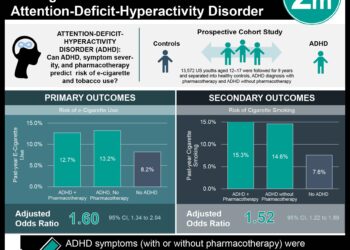E-cigarette marketing associated with subsequent experimentation among youth
1. Youth and young adults who had never used tobacco were surveyed on exposure to electronic cigarette (e-cigarette) marketing and electronic nicotine delivery system use twice over 1-2 years. The majority of respondents reported past-30-day marketing exposure.
2. Youth exposed to e-cigarette marketing had significantly increased odds of having experimented with e-cigarettes when surveyed a second time, compared to youth who were not exposed.
Evidence Rating Level: 3 (Average)
Study Rundown: Electronic cigarette use has been rising among youth and young adults in the United States. There is evidence that e-cigarette use is associated with respiratory problems, nicotine addiction, and subsequent tobacco use. Previous studies have shown that e-cigarette marketing to youth is prevalent, and that exposure to marketing may promote subsequent experimentation. However, previous studies have been cross-sectional, not nationally representative, or excluded young adults. To overcome this, researchers designed this prospective cohort study using data from surveys conducted among youth and young adults who had never used tobacco, measuring recall of exposure to e-cigarette marketing and subsequent experimentation on follow-up. The majority of youth and young adults recalled being exposed to e-cigarette marketing within the past 30 days. Youth exposure to e-cigarette marketing was associated with significantly greater odds of subsequent experimentation. The increased odds were statistically significant for all media forms studied.
These findings are limited by a reliance on self-reported survey data. Furthermore, the survey may not have captured all forms of e-cigarette marketing and thus underestimated overall exposure. Nonetheless, the study is strengthened by its large, nationally representative sample and prospective design. For physicians, these findings highlight the relationship between e-cigarette marketing and use, which could be addressed to curb rising e-cigarette use among youth.
Click to read the study, published today in Pediatrics
Relevant reading: E-Cigarettes and Future Cigarette Use
In-Depth [retroprospective cohort]: Researchers used 2014-2016 survey data from the Population Assessment of Tobacco and Health Study encompassing a nationally representative, longitudinal cohort of youth ages 12-17 years (n = 8121) and young adults ages 18-24 years (n = 1683). The relationship between e-cigarette marketing exposure on print, web, radio, television, and events during wave 2 of the study (2014-2015) and subsequent experimentation with electronic nicotine products during wave 3 (2015-2016) was assessed using multivariable regression, while controlling for age, gender, race, household income, educational attainment, past-month internalizing and/or externalizing problem, and e-cigarette use susceptibility.
The majority of youth (70.7%) and young adults (73.9%) reported exposure to e-cigarette marketing in the past 30 days, and when surveyed during wave 3, 4.9% of youth and 4.5% of young adults had experimented with e-cigarettes. Reported exposure to e-cigarette marketing during wave 2 was associated with subsequent e-cigarette experimentation in the following years during wave 3 (adjusted odds ratio [aOR] = 1.53: 95% confidence interval [CI] 1.07-2.17). E-cigarette marketing in all mediums studied was associated with increased odds of subsequent experimentation.
Image: PD
©2019 2 Minute Medicine, Inc. All rights reserved. No works may be reproduced without expressed written consent from 2 Minute Medicine, Inc. Inquire about licensing here. No article should be construed as medical advice and is not intended as such by the authors or by 2 Minute Medicine, Inc.







